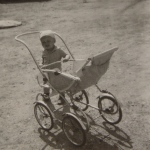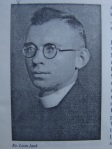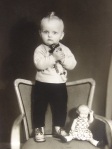 I woke up this morning to a silence that was spreading inward and outward at the same time. Inward, I felt very centered, still chasing the tail of a dream while slowly reaching into the waking life. It was pleasant. Outward, I couldn’t hear any sounds outside the window and I imagined the snow that must have fallen last night. It was pleasant, too.
I woke up this morning to a silence that was spreading inward and outward at the same time. Inward, I felt very centered, still chasing the tail of a dream while slowly reaching into the waking life. It was pleasant. Outward, I couldn’t hear any sounds outside the window and I imagined the snow that must have fallen last night. It was pleasant, too.
When I finally decided to get up, I saw it. The world was white, silent, and still. There is something about the snow that makes me remember the past in details — or perhaps I should say there is something about the snow that makes me see my past the way I want it to be remembered. I am not sure which one is true but I am sure what I remembered this morning.
Here is an excerpt from my novel, To Kill the Other, that was inspired by my childhood, by snow, by my mother. And this is what came to my mind this morning when I woke up to the silent white world.
“You know, it’s funny how everything always somehow comes back to childhood,” Marek said, taking a deep breath.
“Like what?”
“Like the powdered donuts,” he continued.
“Hmm,” Katie said, waiting for him to continue.
“When I see this white powder on donuts, I see myself better.” He wiped his mouth and continued his story while folding the napkin slowly.
Katie crossed her arms as if hugging herself, knowing what was to come.
“Somehow it always goes the same way for me.”
“Why snow?” she asked.
“My mom used to make pączki.”
“What’s that?”
“Similar to donuts, but without the hole inside and…and just different, really…completely different, denser, not as sweet, a bit flaky, and with a teaspoon of thick strawberry jam inside.”
Marek closed his eyes and tilted his head back.
“First she would mix the yeast with a bit of hot water. It was live yeast. It was grayish, chalky, and cold. We would buy it in the store just a block away from our apartment. The lady in the store would cut it with a long knife and weigh it on a scale with a vertical arrow swinging from side to side. I remember we used fifteen decagrams for this recipe.
“I remember my mom checking everything twice—the weight of the yeast and the price. I loved eating it. My mom always objected, saying that I would get sick from it. But I just loved the texture melting on my tongue.
“I remember she would cover the yeast mixture with a linen cloth and put it on the radiator in the hallway for the yeast to rise. She would always tell me not to peek under the cloth because lifting the cloth could make the yeast cool off and drop to the bottom. I always thought if I did it slowly enough and just for a little while the yeast wouldn’t notice. I was sure the yeast could somehow notice things since it was alive.” Marek smiled.
“Making the dough was always fun. We would laugh and knead the dough for eternity. We had so much fun. Then she would ask me to form these dough balls with my hands. She said my hands were the perfect size for it. I was five or six. Then she would make holes in the balls with her finger and put the jam inside. Then she would close it and flatten the balls to make them look more like flying saucers. Finally she would gently put them, one by one, in deep-frying oil, asking me to stay away from the pan. She didn’t want the hot oil to splash on me accidentally.”
“You talk a lot about your mom,” Katie whispered.
“Only when I see something that reminds me of her… which is … about … always.” Marek opened his eyes.
“What about the snow?”
“I still remember her hands whitened with the powdered sugar we would sprinkle on our pączki. We used a small aluminum container that had tiny holes in the bottom. It looked like snow to me. She always allowed me to do it, to use the container. And of course I would make it snow all over the table. ‘Mom, it’s snowing, it’s snowing!’ I would scream.
“‘Just like outside. Look! Look!’ she would say in such an excited voice. We would look out the kitchen window to see snow coming slowly in the pools of streetlights at night. I would make it snow on her hands, on her wedding ring, on her other ring with a little pale pink stone.” Marek stopped for a while.
“Her eyes meant the world to me. I feel her so close sometimes,” he whispered. “Especially when I see Julie. My little Julie looks so much like my mom. Sometimes I imagine how much fun it would be to see them together.”
“Does Julie have the same attitude?” Katie smiled.
“Yep, she is six, going on sixteen,” Marek said, smiling back.
“And she has been going on sixteen ever since I can remember,” Katie said, reaching for her coffee.
“Since she was one year old.” Marek nodded.
They both stared at the box of Dunkin’ Donuts for a long while, not saying anything.

















